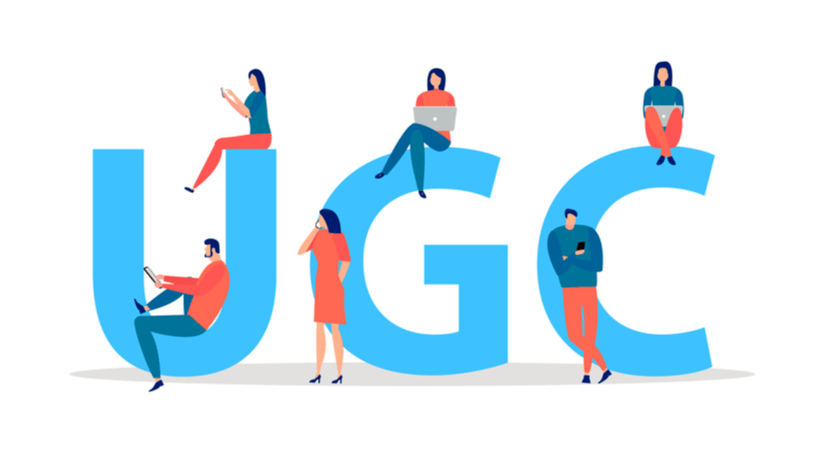
Content comes in multiple forms, especially today with the advent of the internet. And because the content is so easy to produce and publish, some of this content is produced by brands, and some by users. User-generated content, or UGC, refers to any text, images, videos, or reviews that are created by people, not brands.
However, brands may share UGC on their own social media handles, websites, and other marketing channels. Since the explosion of social media, Facebook and Instagram have become platforms for UGC. Users create and share various posts featuring brands, and if you are a marketer, you get free exposure when they recommend your products and services to their audiences. You can even re-share that content with your own audience, boosting your market credibility.
Why is User-Generated Content so sought after by Companies?

As humans, our inherent nature is to distrust marketers and advertisements. An easy example would be the difference between the appearance of fast food in ads, and fast food in real life. Now, visit the Instagram page of McDonald’s or Wendy’s, and you’ll see that the burgers look phenomenal. In real life, they aren’t half as aesthetic. Now, consider this. A famous food influencer visits a burger chain, takes an aesthetically pleasing photo of the same burger, and uploads it on their Instagram handle. Suppose they have 20,000 followers. Now, these people will be influenced to try out burgers from the same chain. People have become increasingly distrustful of advertising and the media over the years. Suppose you are the owner of the aforementioned burger chain. It would be prudent for you to encourage User-Generated Content rather than choose direct advertising.
Why is User-Generated Content so Effective with Consumers?

User-Generated Content is very effective because it does not come directly from the marketers, it comes from actual users and influencers. This makes it more believable as social proof. Nowadays consumers demand an engaging shopping experience. They want to ask questions, but not necessarily to sales representatives. They want fellow consumers to share insights and ask them questions about their purchases and traditional static advertising doesn’t fit the bill. UGC is thus leaving behind traditional marketing methods in terms of bolstering consumer confidence and influencing their marketing decisions.
Online Privacy, User-Generated Content, And Legal Trouble

UGC raises concerns because photos, videos, comments, and posts feature actual people’s names, faces, and personal information. This information can be used to identify someone, which is why UGC is categorized as personal data. It comes under the purview of the General Data Protection Regulation (GDPR). As a marketer, you need to disclose your purpose behind collecting UGC and must take certain steps to keep information safe, and allow your users to have rights regarding the usage of their data. If companies are not careful, they can get into trouble.
A case in point is beer manufacturer Anheuser-Busch InBev (AB InBev). In 2014, the company asked its social media followers to submit pictures for an ad campaign. One of those submissions was from Kayla Kraft, wearing a fake mustache, drinking a bottle of the beer. The company used the photo on posters and coasters. Ms. Kraft was unhappy and claimed that she had posted this photo on her private Facebook page, and had not intended it to be used for promotional measures. She hit AB InBev with a lawsuit for violation of privacy. While this is still being disputed in court, there’s no denying the dent the lawsuit might have caused to AB InBev.
Steps For Minimizing User-Generated Content Privacy Costs

Dealing with lawsuits is expensive both in terms of monetary costs and the damage it does to a brand’s reputation. You can avoid this by implementing the following steps.
Clear Terms and Conditions
Be very clear about the terms and conditions specific to each UGC campaign that you are running. This is very important if you plan to publish the UGC outside social media–or even if you don’t; it’s important to be prepared. Ensure that your terms and conditions minimize the likelihood of entrants submitting offensive or inappropriate UGC, by explicitly stating that people may not submit harassing, defamatory, hateful, violent, vulgar, or obscene content. Make sure your terms and conditions are mentioned right at the start of any UGC campaign that you wish to undertake.
Solicit Agreements Before Publishing
Sometimes, it gets difficult to get users to actively agree to terms and conditions before they create UGC. If someone submits UGC and encounters legal issues, it won’t help if you just read out your terms to them and assume their agreement. You need to actively seek their permission before publishing any content. Sending a direct message to users, explaining where you plan to publish their content; whether you plan to use their name, social media handle, or personal information; and reiterating your terms and conditions and privacy policy is very important. Never assume that someone has read your terms and conditions when submitting content to you.
Have a Clear and Comprehensive Privacy Policy
Any company’s privacy policy needs to be clear in all the ways in which users’ data will be collected, used, stored, or shared. Privacy policies are important because:
- They’re legally unavoidable unless you want major legal hassles later on. In fact, global privacy laws dictate what you can or cannot do.
- Consumers feel safe when they see a privacy policy that safeguards their interests.
When creating UGC, users submit sensitive information, including their names and social media handles. This is voluntary information, but your privacy policy needs to be clear on what type of information is being collected. Check out our privacy policy here to get an idea of what one should ideally look like. That said, we are not attorneys and we’re not experts in your industry so it’ would be helpful for you to get professional feedback on your own privacy policy.
Licensing Agreements
Another way to avoid trouble with UGC is to ensure content creators sign a license agreement. This gives you, the business, and the marketer certain rights to use and publish their content. Typically, software developers use End User Licence Agreements which grant users permission to use said software. Something similar targeted to UGC content creators for permission to use their content can save legal trouble in the future.
Final Thoughts
In conclusion, while there can be a copyright infringement, offensive content, defamation, or other legal issues, there are ways you can offset these risks and prevent any privacy issues. Clear and concise terms and conditions that people understand, and ensuring that UGC is covered in your privacy policy is a great way to ensure that your UGC marketing strategy is watertight. Read our blog to learn about how data privacy is being safeguarded in our digital world.
